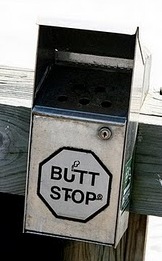September 7th, 2010 by RyanDuBosar in Better Health Network, Health Tips, News, Research
No Comments »

 Doctors may want their patients to stick with a smoking cessation regimen even if it’s not initially working, report researchers who found that “delayed quitters” accounted for a third of former smokers who went a year without cigarettes.
Doctors may want their patients to stick with a smoking cessation regimen even if it’s not initially working, report researchers who found that “delayed quitters” accounted for a third of former smokers who went a year without cigarettes.
Quit rates may be significantly increased by just continuing in motivated but initially unsuccessful patients during the first eight weeks of treatment, according to research published online in the journal Addiction. There’s actually two types of successful quitters: Those who quit immediately and those who are “delayed” but eventually successful. Read more »
*This blog post was originally published at ACP Internist*
July 6th, 2010 by Harriet Hall, M.D. in Better Health Network, Health Tips, News, Research
1 Comment »

Shingles (herpes zoster) is no fun. It usually begins with a couple of days of pain, then a painful rash breaks out and lasts a couple of weeks. The rash consists of blisters that eventually break open, crust over, and consolidate into an ugly plaque. It is localized to one side of the body and to a stripe of skin corresponding to the dermatomal distribution of a sensory nerve.
Very rarely a shingles infection can lead to pneumonia, hearing problems, blindness, brain inflammation (encephalitis) or death. More commonly, patients develop postherpetic neuralgia (PHN) in the area where the rash was. The overall incidence of PHN is 20%; after the age of 60 this rises to 40%, and after age 70 it rises to 50%. It can be excruciatingly painful, resistant to treatment, and can last for years or even a lifetime. Read more »
*This blog post was originally published at Science-Based Medicine*
April 24th, 2010 by Toni Brayer, M.D. in Better Health Network, Health Tips, Research
No Comments »

There are many expensive and complicated treatments for migraine headaches, but a new literature review shows that a single, 1,000mg-dose of aspirin is effective for more than half of all migraine sufferers.
Compared with placebo, aspirin reduced the symptoms of nausea, vomiting, sensitivity to light (photophobia) and and sound (phonophobia), and eliminated severe or moderate pain within two hours in 24 percent of people. Read more »
*This blog post was originally published at EverythingHealth*
February 4th, 2010 by Debra Gordon in Better Health Network, Quackery Exposed, True Stories
No Comments »

 So my cousin emailed me the other night. She had a breast cancer recurrence about 6 years ago. Before you feel too sorry for her, however, know this: She’s doing great, moving from one targeted treatment/chemotherapy/laser knife procedure to another. Her doctors are fabulous. Her attitude is amazing. And, as she constantly tells us, she feels great and is loving life. No, this isn’t about her. It’s about her friend, the one she emailed me about.
So my cousin emailed me the other night. She had a breast cancer recurrence about 6 years ago. Before you feel too sorry for her, however, know this: She’s doing great, moving from one targeted treatment/chemotherapy/laser knife procedure to another. Her doctors are fabulous. Her attitude is amazing. And, as she constantly tells us, she feels great and is loving life. No, this isn’t about her. It’s about her friend, the one she emailed me about.
Her friend was diagnosed with an early stage of an aggressive form of non-small cell lung cancer a year ago. After chemotherapy, a CT scan this summer showed her lungs clear of cancer; but a followup CT scan last week showed some spots. This woman had participated in a clinical trial during her first round of treatment and her doctor wanted her to join another clinical trial. But my cousin’s friend is freaked out; she doesn’t want to feel like a “guinea pig.” So when her daughter suggested she see a doctor who specializes in an unproven and experimental therapy called insulin potentiation therapy, she was ready to call for an appointment. Read more »
*This blog post was originally published at Debra Gordon's Musings on Medicine and Health Care*
November 19th, 2009 by Steve Novella, M.D. in Better Health Network, Quackery Exposed
4 Comments »

Homeopathy, as a cultural phenomenon, remains an enigma. In the two centuries since its invention it has failed to garner significant scientific support. In fact, developments in physics, chemistry, biology, and medicine have shown the underlying concepts of homeopathy to be wrong – guesswork and speculation that lept in the wrong direction.
It turns out, like does not cure like. This is nothing more than sympathetic magic – popular at the time but now considered nothing more than superstition without any scientific basis.
It also turns out that diluting a substance does not make it more potent – this nonsensical idea (ridiculed even in the 19th century) violates the laws of thermodynamics, and the chemical principle of mass action. This is especially true when you dilute a substance beyond the point where chance would have even a single molecule of active ingredient left behind. The background noise of chemicals in homeopathic water is orders of magnitude greater than the signal of whatever had previously been diluted in it. Read more »
*This blog post was originally published at Science-Based Medicine*
 Doctors may want their patients to stick with a smoking cessation regimen even if it’s not initially working, report researchers who found that “delayed quitters” accounted for a third of former smokers who went a year without cigarettes.
Doctors may want their patients to stick with a smoking cessation regimen even if it’s not initially working, report researchers who found that “delayed quitters” accounted for a third of former smokers who went a year without cigarettes.














